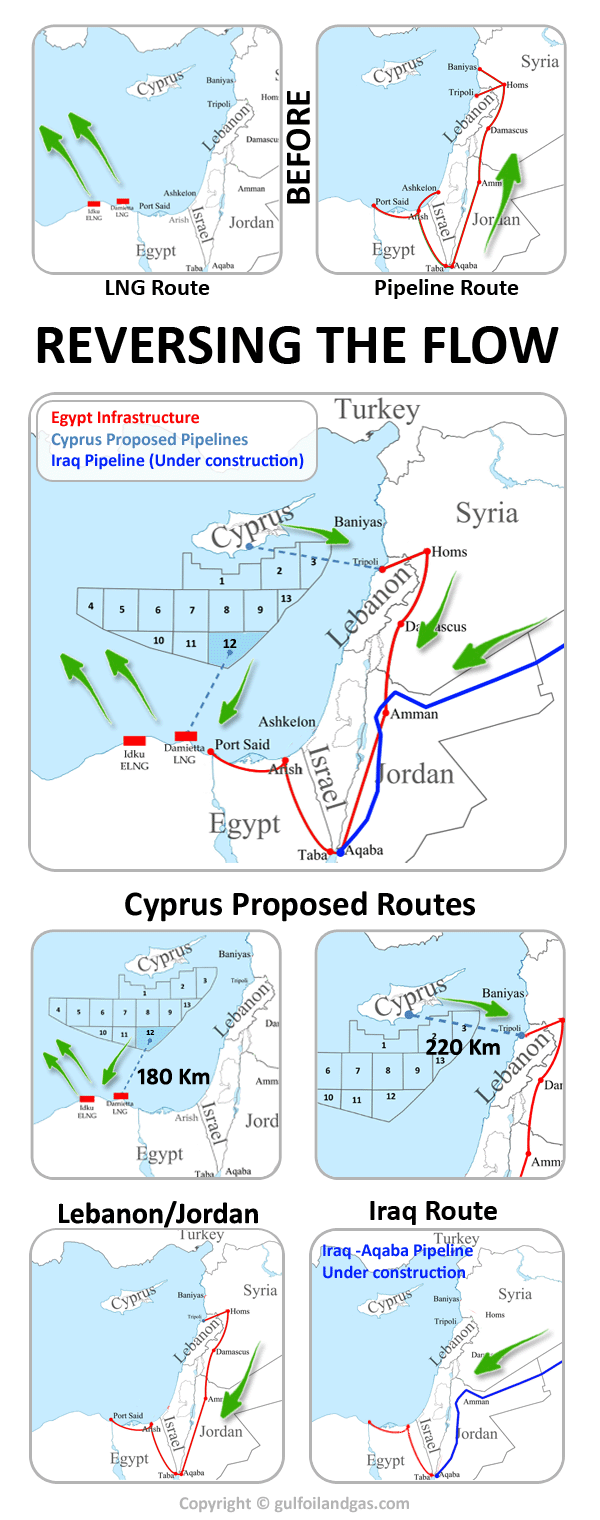Egypt Gas Puzzle: Reversing the Flow?Source: Gulfoilandgas.com - Articles 4/2/2014, Location: Egypt |
|
|
|
|
 This is the third in a series of articles written about "Egypt Gas Puzzle". The first article appeared in Gulfoilandgas.com on March. 13 and describes the idle Natural Gas Export Infrastructure in Egypt. The second article, on March 19, analyzes the different groups fighting over Egypt's Natural Gas. This article focuses on opportunities and options to secure gas supply in the Mediterranean region through Egypt.
Business Tycoons: A short-term gas supply gap for a long-term comfort zone The peak in gas demand is normally triggered during Egypt's hot summer months to fulfill the power generation needs of the country. The short-term gas shortage coupled with the current political vacuum offer a window of opportunity for two visible groups to unite for one common goal: the introduction of coal to Egypt. According to those groups, coal is the only viable alternative for natural gas. Government officials, who set the gas export strategy during the last 15 years of Mubarak’s rule, represent the first group who likes to see a long-term gas surplus for export to justify the decision to build the expensive gas export infrastructure. On the other hand, Egypt's cement business tycoons represent the second group who wants to maximize profits and avoid paying high prices after removal of subsidies on natural gas. A third invisible group is directly or indirectly linked to deals with global coal producers and ready to capture the expected fortune from the introduction of the coal business to Egypt. Environmentalists and the civil society are leading the opposition to the introduction of coal and in the absence of an elected parliament to moderate a healthy national debate, the policy makers in Egypt find themselves under a great pressure to deliver NOW on the Energy front. Today, coal supporters in Egypt are using every possible weapon to win the coal import battle. Therefore, advancing any quick solution including the below model to fix the gas puzzle would weaken the coal introduction argument in Egypt. Could Egypt become the natural gas export hub for the East-Mediterranean? The $16bn idle gas export infrastructure case is a clear example for how things went wrong in Egypt during Mubarak’s presidency. A 1,200 km pipeline was supposed to carry Egyptian gas to Israel and East Mediterranean Arab countries. Two LNG plants were built to export gas to Spain, France and few other countries. Unfortunately, numbers proved to be wrong leaving no gap between supply and demand and at current consumption levels, Egypt will not have enough gas surplus for Export. New Gas discoveries in the East-Mediterranean neighboring countries are a game changer. When it comes to gas transportation, emerging East-Med exporters face many challenges. Unlike other commodities, exporting natural gas is a very expensive decision. East-Med producers have to build expensive infrastructure and to wait few years before getting the first gas shipment to consumers. Cyprus is trying to justify the construction of Vassilikos LNG plant which will cost around $12bn. Israel, the US and the EU are putting pressure on the Cypriot government to go ahead with the project. The investment is huge and risky especially when you carefully study the negative experience of Egypt. Recent developments in the Mediterranean bring a new dimension to the Egyptian case. Today, there is a good opportunity for Egypt to capitalize on the existing gas export investments and to redefine its role as the regional hub for gas export by reversing the gas flow direction. Reversing the flow will provide Egypt with:
Sources and routes of the export gas hub model The situation can be completely changed if Egypt export assets come to the picture. The following infographic describes possible scenarios which can ultimately redefine the East-Med Energy corridor.  This section lists the export options for sending gas to Egypt:
Conclusion There is no doubt that Egypt's gas export infrastructure can be an excellent opportunity to achieve energy security for Egypt. It is obvious that redefining Egypt gas export role in the East-Med has many benefits for Egypt and the Mediterranean countries. However, the timing for reversing the flow may not be in the best interest of those who want to capitalize on the pressure of a temporary gas supply gap to introduce coal to Egypt. The question now is: can gas producers in East-Med wait? Articles in the Egypt Gas Puzzle series:
|
|
 |
|||||
|
Oil Egypt E-Marketplace - Subscription Packages - Benefits |
||
|